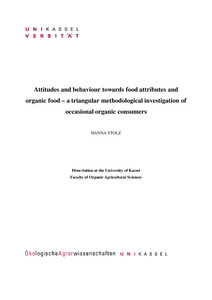| dc.date.accessioned | 2012-01-04T14:52:19Z | |
| dc.date.available | 2012-01-04T14:52:19Z | |
| dc.date.issued | 2012-01-04 | |
| dc.identifier.uri | urn:nbn:de:hebis:34-2012010440188 | |
| dc.identifier.uri | http://hdl.handle.net/123456789/2012010440188 | |
| dc.description.sponsorship | Funding from the European Community under the Sixth Framework Programme for Research, Technological Development and Demonstration Activities for the Integrated Project QUALITYLOWINPUTFOOD, FP6-FOOD-CT-2003- 506358 | ger |
| dc.language.iso | eng | |
| dc.rights | Urheberrechtlich geschützt | |
| dc.rights.uri | https://rightsstatements.org/page/InC/1.0/ | |
| dc.subject | organic food | eng |
| dc.subject | consumer preferences | eng |
| dc.subject | attitudes | eng |
| dc.subject | buying behaviour | eng |
| dc.subject | multinomial logit model | eng |
| dc.subject | preference heterogeneity | eng |
| dc.subject.ddc | 300 | |
| dc.title | Attitudes and behaviour towards food attributes and organic food – a triangular methodological investigation of occasional organic consumers | eng |
| dc.type | Dissertation | |
| dcterms.abstract | Organic food is increasingly available in the conventional food retail, where organic products are offered alongside with various other types of products and compete mainly with conventional and the so-called conventional-plus products. The latter are conventional products displaying particular quality attributes on the product packaging, such as ‘no artificial additives’, or ‘from animal welfare husbandry’. Often, these quality attributes also apply to organic products. Occasional organic consumers might prefer such conventional-plus alternatives that are perceived to be ‘between’ organic and conventional products.
The overall objective of this PhD thesis was to provide information about the segment of occasional organic consumers. In particular, the thesis focussed on consumer perceptions and attitudes towards the quality of, and preferences for, organic, conventional and conventional-plus products in two countries: Germany and Switzerland.
To achieve these objectives, qualitative and quantitative consumer research was combined in order to explore occasional organic consumers’ perceptions and attitudes as well as to observe their preferences and buying behaviour regarding different types of food products: organic, conventional and conventional-plus products.
The qualitative research showed that, depending on single criteria, organic production was both positively as well as negatively assessed by consumers. Consumer perception of organic food was found to be highly selective and primarily focussed on the final stage of the particular production process. A major problem is that consumers are still mostly unfamiliar with factors associated with organic production, have a lack of confidence, and often confuse organic with conventional products. Besides this, consumer expectations of organic products are different from the expectations of conventional products.
The quantitative research revealed that attitudes strongly determine consumers’ preferences for organic, conventional and conventional-plus products. Consumer attitudes tended to differ more between organic and conventional choices rather than conventional-plus and conventional choices. Furthermore, occasional organic consumers are heterogeneous in their preferences. They can be grouped into two segments: the consumers in one segment were less price sensitive and preferred organic products. The consumers in the other segment were more price sensitive and rather preferred conventional-plus or conventional products.
To conclude, given the selective and subjective nature of consumer perception and the strong focus of consumer perception on the final stage of the food production process, specific additional values of organic farming should be communicated in clear and catchy messages. At the same time, these messages should be particularly focussed on the final stage of organic food production. The communication of specific added values in relation with organic products to improve the perceived price-performance-ratio is important since conventional-plus products represent an interesting alternative particularly for price sensitive occasional organic consumers. Besides this, it is important to strengthen affirmative consumer attitudes towards organic production. Therefore, policy support should emphasise on long-term communication campaigns and education programmes to increase the consumer awareness and knowledge of organic food and farming. Since consumers expect that organic food is regionally or at least domestically produced while they less accept organic imports, policy support of domestic and regional producers is a crucial measure to fill the current gap between the increasing consumer demand of organic food and the stagnation of the domestic and regional organic food supply. | eng |
| dcterms.accessRights | open access | |
| dcterms.creator | Stolz, Hanna | |
| dc.contributor.corporatename | Kassel, Univ., Fachbereich Ökologische Agrarwissenschaften | |
| dc.contributor.referee | Hamm, Ulrich (Prof. Dr.) | |
| dc.contributor.referee | Zander, Katrin (Dr.) | |
| dc.subject.swd | Biologische Landwirtschaft | ger |
| dc.subject.swd | Lebensmittelkauf | ger |
| dc.subject.swd | Verbraucherverhalten | ger |
| dc.date.examination | 2011-11-25 | |

